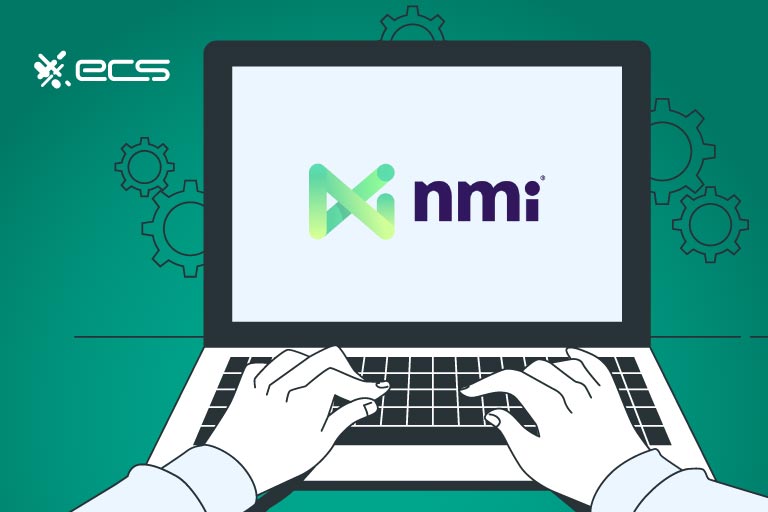One of the biggest problems that business owners face is scaling their payment technology while they scale their business. Solutions that once fit their initial sales volume do not often translate well with increased sales.
That’s where a company like NMI comes in. NMI’s mission is to democratize the payment landscape, making it easier for SMBs to scale. Their modular platform allows merchants to mix and match from a range of core services and added value services. It’s an exciting landscape powered by core values of innovation and flexibility.
NMI is powering about $203 billion in payments per year. NMI is partnered with over 3,500 technology organizations. Delivering the most up-to-date, nuanced solutions to their merchant partners. Over 277,000 are using NMI solutions to run 2.2 billion transactions over 237,000 connected devices.
ECS in Partnership with NMI
NMI and ECS payments have an exciting partnership that will leverage the strength of both companies. Executive leadership at NMI is comprised of some payment landscape veterans. CEO Vijay Sondhi was previously the head of Visa’s corporate strategy, along with running their CyberSource and Authorize.Net businesses. His corporate CV includes positions at Oracle, OpenText, and SAP, while he has also served as the CFO for 3 separate venture-backed fintech companies.
The remainder of the NMI c-suite is equally exciting. Many of the corporate officers bring several decades of fintech experience to the table (in addition to personal interests in travel, food, and fine cigars). In all seriousness, the fintech experience of the C-suite, coupled with their diverse range of interests and experiences, creates a relatable team. One that is well-poised to understand the needs of a wide range of merchants.

Funding, Partnerships, and a History of Achievements
In addition to stellar corporate leadership, NMI partners with investors who specialize in fintech and payments.
Francisco Partners have raised $24 billion for over 200 fintech companies. Great Hill Partners has raised $7.7 billion to recapitalize and expand companies in the growth phase. And lastly, Insight Partners has raised $30 billion to invest in over 400 companies in high-growth software.
The combination of experienced and innovative leadership with established venture capital is very promising for MNI, ECS, and their various partner merchants.
NMI was at the forefront of pioneering web payments in 2000. Just 3 years later, they certified the world’s first EMV Kernel. In 2010, they continued their foray into EMV tech with the first chip card solution for mobile. Year by year, they added new innovations and acquired new partners, surpassing $1.2 billion in transactions in 2019.
Today, NMI is forward-thinking and prides itself on extending future-proof services to its merchants. With the flexibility offered by their modular paradigm, merchants can integrate all aspects of the payment landscape and continue to grow with their sales volume.
What Can NMI Do For Your Business?
NMI payment gateway features provide a number of solutions for merchants. NMI offers API integration with over 200 different payment processors and 150 shopping carts. These numbers are significant indicators of their versatility.
Visa estimates there are 1,300 different payment processors worldwide, which means that NMI merchants have around 15% of the payment processing landscape at their fingertips. Let’s take a deeper look at some of the core functionalities offered by NMI and how they can help their merchant partners.
Accept All Types of Currency
NMI merchants can accept payments in USD, CAD, AUD, and dozens of other international currencies. Global eCommerce will grow at a rate of nearly 9% in 2023, reaching a worldwide valuation of $5.9 trillion. Some of the fastest-growing marketplaces are Asia, Australia, and South America.
This means that if businesses want to expand into ripe new markets, they need to speak the local language during the checkout process. This can be costly if using cookie-cutter domestic payment gateways, by the time currency exchange rates and fees have been applied. But NMI merchants can cut out the middleman by accepting the local currency.
Close More Sales Over the Phone
NMI merchants will be able to take virtual terminal payments. This means that NMI can process phone and paper mail orders without actually having to handle the customer’s credit card. The merchant can input the credit card information into the interface and run the charge.
For service-based businesses and sales organizations, this is vital. In sales, for instance, 92% of customer interactions happen over the phone. Instead of directing potential clients to a landing page (only to see a significant portion of them drop off), Merchants can seamlessly wrap over the phone payments into the close.

Sell Goods and Services Even Without A Shopping Cart
NMI merchants can use a hosted payment page, accessed with a collect checkout feature. The collect checkout button can be put into an eCommerce site that doesn’t have its own shopping cart functionality. While it’s true that 500,000 businesses (in 175 countries) use Shopify, that means most of the 400 million SMEs around the world do not.
These businesses websites that for whatever reason, they are choosing to keep lo-fi. Lacking built-in payment solutions, these business owners can use NMI as their outsourced payment processor. Customers can click a button and be directed to a page for inputting payment information.
Use Webhooks to Automate Integrations
NMI merchants can benefit from webhooks that keep the lines of communication open. Webhooks can automate the integration between two software platforms, without having to manually engage with application programming interfaces. Most SMEs have a limited budget to spend on tech support and IT infrastructure.
Solutions like webhooks can automate the process of sharing data between applications and keep the proverbial engine running. In an era of software integrations simplifying operations and improving efficiency, these webhooks allow SMEs to take advantage of the latest cloud-based software solutions, without having to invest manual effort in managing their connectivity.
Save More Time and Money With Batch Processing
NMI merchants can use batch processing. Batch processing involves taking large quantities of data and sending them all at once, rather than having to send them one at a time. Batch processing is typically used with ACH transfers between checking accounts, but they can also be used with other payment types as well.
For merchants who are engaged during the business day, batch payments can be a one-off event at the beginning or end of the day, saving time. For businesses that do a significant amount of invoicing, such as B2B sales, this functionality is a vital time and resource saver.
Remodel Your Gateway Without All The Expenses
NMI merchants can use a gateway emulator. These emulators can help them migrate from a previous payment gateway without having to rework or reprogram their existing payment infrastructure. Data migration is expensive.
Take, for example, a small business migrating to a cloud-based payment processing gateway, and having to redesign their customer-facing payment interface. These types of migrations alone can range from $5,000 to $500,000 or more.
This type of expense can be sidestepped with a payment gateway emulator. You can continue to present the same gateway to your customers, avoiding an off-putting discontinuity.

Accept All Types of Credit and Debit Cards
NMI merchants can take all types of payments, even beyond the four horsemen of the payment apocalypse (Visa, Mastercard, American Express, Discover). Diners Club, China Union Pay, JCB, Google Pay, and Apple Pay are just a few of the other payment options merchants can offer their customers. Over 52% of polled consumers stated that they want multiple payment options at checkout.
The average American consumer carries 4 credit cards on their person. Sometimes customers do not have a particular payment method on hand (they’ve temporarily lost their debit card) or a certain card has no available funds (they’ve maxed out their credit). But consumers also each have their own preferred payment methods and may abandon their shopping cards if they don’t see them offered.
Sell Subscriptions and Take Recurring Payments
NMI merchants can handle recurring billing. The subscription business model is the hottest thing in multiple sectors, growing six times faster than the S&P 500 in the past decade. Americans are consuming 53% of subscriptions, spending a monthly average of $273.
Millennials have as many as 17 subscriptions each, with entertainment companies like Netflix, Hulu, and Disney+ leading the way. But physical product subscriptions are also a serious market sector, representing 45% of the global valuation. Whether you’re selling cloud-based software or a monthly delivered box of scented soaps, NMI can facilitate recurring, secured payments.
Leverage the Latest Contactless Payment Technology
NMI merchants can use the latest contactless consumer-facing tech like QR codes. QR codes are black-and-white checkerboard patterns that customers can scan with their phones. This in turn takes them to an online payment gateway.
Consumers have responded positively to QR code usage, with 6.9 million scans in 2022, a 433% increase from the previous year. The restaurant industry is one space where QR codes seem to be taking over. Diners can scan QR codes to access menus, place orders, and settle their bill. This reduces the fraud risk of waiters taking a plastic credit or debit card to the back.
Keep Your Inventory Organized
NMI merchants can enjoy product management integration. Merchants can enter product SKUs and keep their inventory organized, with the assistance of their POS technology. Rather than manually synchronize reported sales and their inventory, they can rely on their payment processing software to take care of that automatically.
Another benefit to these integrations is that they can improve efficiency. Retailers may be inflating their inventory costs by 30% every year for excess inventory. Software-assisted automation can remove some of the guesswork and mistakes generated by fatigue from manual processing.

Split Up Payments From the Same Gateway
NMI merchants can use transaction routing to split up payments from a single gateway. This allows NMI merchants to work with multiple payment processors to get the right cocktail of favorable processing fees.
For merchants with high volumes of transactions, this can sometimes assist in avoiding volume-based fees (if applicable) or being forced to pay more for transactions that should really cost less. This versatility does not have to come at the cost of sacrificing a single payment gateway for receiving payments.
Additional NMI and ECS Payments Gateway Features
Automatic Card Updater
ACH payments are great for eliminating payment discontinuity because they use bank accounts and routing numbers. But unavoidably, a majority of consumers will prefer to tender debit and credit cards, even for recurring bills. The downside for merchants is that cards can get lost or stolen. They also eventually expire.
The change of numbers can disrupt subscription cash flow, and even result in losing customers for good. No more with automatic card updating software. Card-on-file information can be updated while staying PCI compliant.
Electronic Invoicing
Adobe estimates that a single paper invoice can cost as much as $40 to process. B2B businesses are particularly built on invoicing. At $40 per invoice, this is simply an untenable expense.
While business owners have put up with the cost of paper processing for centuries, today’s SMEs are seeing the value of going digital. NMI merchants can use electronic invoices to collect payment from clients with just a few clicks (or thumb taps, in the case of mobile).
The Token Vault
Tokenization is at the forefront of keeping customer payments secure. In a nutshell, it works by converting relevant customer information into an unrelated string of information. This encryption process prevents outsiders from unscrambling the data to use for their own ends.
Tokenized cardholder data is important for businesses that run on a subscription model, and need to save card information to bill their customer periodically.

Fraud Prevention
Today’s cybercriminals are always trying to get ahead of the curve. Thankfully organizations like NMI are one step ahead of them. With the latest anti-viral software, firewalls, and proxy piercing, fintech companies like NMI can keep your payment ecosystem secure from fraud.
Around 61% of SMBs are attacked by cybercriminals, and 37% of the companies hit with ransomware had less than one hundred employees. As you can see from these statistics, small businesses are particularly vulnerable to these types of attacks and can benefit immensely from outsourcing IT security to a larger, more adept organization.
QuickBooks Plugins
Around 80% of SMBs are using QuickBooks (which makes us wonder what the other 20% are doing). However, despite QuickBooks’ many wonderful functionalities, business owners still have to input data. Or do they?
QuickBooks integrations can connect payment processing software to their accounting suite, simplifying the bookkeeping process. Some estimates suggest that the average SMB owner may spend as many as 120 days per year involved in administrative tasks like accounting. With integrations like those connecting your POS technology to Quickbooks, a significant portion of this time (and energy or money) can be reduced.
PCI Compliance with NMI and ECS Payments
One of the most burdensome aspects of the payment landscape is meeting Payment Card Industry Data Security Standards (PCI DSS). PCI DSS standards regulate how organizations store customer card data, which is particularly relevant for recurring billing.
These standards are set by card networks and banks, and include 12 core principles and best practices that organizations must adhere to.
The cost of a PCI audit alone can start at $15,000. This does not include the setup of IT infrastructure and maintenance of security systems like firewalls. Most SMBs do not have the resources to meet these standards.
The best solution is to outsource these security processes to a payment processor. However, not all payment processors offer PCI compliance and not all those that do have the highest level certifications.
NMI has always had security and PCI compliance as core principles. In fact, they were one of the first non-bank organizations to hold cross-region compliance. They undergo annual independent security assessments to make sure they are adhering to the highest standards set by Visa and Mastercard.
When you enroll to process your payments through ECS, our client success team helps set you up for success and connects you to the right channels to become and maintain PCI compliance.
NMI And ECS Payments Create Flexibility
As mentioned, modular flexibility is at the core of NMIs offerings. Many business owners these days get their start on a cloud-based platform like Shopify, Etsy, or even eBay. They may leverage the assistance of large payment aggregators like Stripe, Square, or Venmo. These solutions are simple, but no longer cost-effective as a business scales.
They also lack the nuance required of a growing business. The flat-rate fees and cookie-cutter solutions provided by these large behemoths are constricting and inflexible. There are some limitations to the vendors, hardware, systems, and methods that merchants can use. A merchant may feel confined by these structures.
Unable to grow, they will look for another payment processor. But few processors can offer modularity at the core of NMI’s philosophy. NMI is poised to offer merchants the flexibility that is lacking in other payment processing solutions. Combined with the experience of ECS Payments and their full range of merchant services, this is a promising partnership for business owners and sales organizations everywhere.
If you’re looking for more information about payment processing, ECS has you covered. Check out our most recent payment processing articles here.
